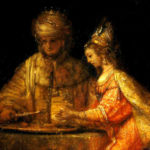We run our website the way we wished the whole internet worked: we provide high quality original content with no ads. We are funded solely by your direct support. Please consider supporting this project.
How do you respond to Romans 11:36?
“For from him [God] and through him and to him are all things.”
Calvinists sometimes cite this doxology as evidence that Paul believed that every single event in world history was from, through and for God. In light of the fact that the verses leading up to this doxology address God’s genuine frustration with Israel’s unbelief (Rom. 11:7, 20–23, cf. 9:30–32; 10:3) this seems like an extremely odd conclusion to draw.
If the Israelites’ unbelief came from God, why would God be frustrated over it? Paul’s primary goal throughout Romans 9-11 is to show that even though both Jews and Gentiles can and do resist God’s will, God’s overall purposes for history will be achieved. It is in this sense that we should understand Paul’s doxology. All things—including free will—come from God and, in one way or another, will eventually end up glorifying God.
Category: Q&A
Tags: Q&A, Responding to Calvinism
Topics: Providence, Predestination and Free Will, Responding to Objections
Verse: Romans 11
Related Reading

What is the significance of Matthew 25:41?
The Lord teaches that on the judgment day he will say to the wicked, “Depart from me into the eternal fire prepared for the devil and his angels…” Hell was expressly prepared for “the devil and his angels”; humans were never meant to go there. But if God eternally knew that certain persons would end…

What’s the signficance of Judges 10:6-17
The Israelites rebelled against Yahweh and worshipped other gods. As a result, Yahweh withdrew his protection of them and “sold them into the hands of te Philistines and the Ammonites” (Judg. 10:6-7). The Israelites eventually acknowledged their sin and cried out to God (vs. 10) but Yahweh, perhaps perceiving that their repentance wasn’t genuine, told…

What is the significance of Esther 4:14?
The wise Mordecai encourages Esther to bravely risk her life by pleading the case of the Jews before King Xerxes, saying, “…if you remain silent at this time, relief and deliverance for the Jews will arise from another place, but you and your father’s family will perish. And who knows but that you have come…

What is the warfare worldview?
The warfare worldview is based on the conviction that our world is engaged in a cosmic war between a myriad of agents, both human and angelic, that have aligned themselves with either God or Satan. This is the view that is presupposed throughout the entire Bible, and it’s especially evident in the New Testament. For…

What is the significance of Jonah 1:2; 3:2, 4–10; 4:2?
God “changed his mind” (3:10) about the destruction he planned to carry out on Nineveh. If all events in history are eternally settled and known by God as such, his word to Jonah that he planned to destroy Nineveh in forty days was insincere as was his inspired testimony that he in fact changed his…

How does an Open Theist explain all the prophecies fulfilled in the life of Jesus?
Question: Throughout the Gospels it says that Jesus “fulfilled that which was written.” Some of these prophecies are very specific and involve free decisions of people. For example, a guard freely chose to give Jesus vinegar instead of water (Jn 19:28), yet John says this was prophesied in the Old Testament, hundred of years before…
